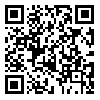BibTeX | RIS | EndNote | Medlars | ProCite | Reference Manager | RefWorks
Send citation to:
URL: http://salmandj.uswr.ac.ir/article-1-1098-en.html
2- Department of Health Care Management, School of Management and Medical Informatics, Shiraz University of Medical Sciences, Shiraz, Iran.
3- Department of Management, Policy and Health Economics, School of Management and Medical Informatics, Kerman University of Medical Sciences, Kerman, Iran.
4- Department of Clinical Pharmacology, School of Pharmacology, Shiraz University of Medical Sciences, Shiraz, Iran.
Objectives: Medication is an essential component of care for elderly patients, and optimizing their process of treatment is often a challenging task. The aim of this study was to evaluate the status of appropriate non-prescribed drugs in 60 elderly patients hospitalized in the teaching and non-teaching hospitals in the University of Medical Sciences employing the START screening tool.
Methods & Materials: This cross-sectional study included 400 elderly patients who were randomly selected from various divisions of the hospital (CCU, ENT, ICU General, Orthopedics, Surgery General, and Internal) and were hospitalized within six months duration (from June to December 2013). The data of the selected patients were collected from the hospital records in order to determine the appropriate medications prescribed based on the criterion START. The data was analyzed- using software Excel 2013 and SPSS 18, and the relationship between the variables was determined using the chi-square test, Mann-Whitney, and Spearman correlation coefficient.
Results: The average age of the elderly patients was reported to be 73.4 years. Cardiovascular disease had the largest prevalence (21.6%) and diabetes (3.0) had the lowest prevalence among the elderly patients. The total number of drugs prescribed for patients was 4744, of which 158 patients (39.6%) were not prescribed with at least one appropriate medication. In non-training and training hospitals, the most appropriate medications that were not prescribed according to START were related to the bisphosphonates (11.7% vs. 13.3%) and anti-diabetic (8.3% vs. 11.4%) categories. A significant relationship was noted between the average numbers of non-prescribed appropriate medications and the length of stay of patients in teaching hospitals.
Conclusion: Since issues relating to the appropriate medications prescribed among the elderly can have serious implications, the drugs prescribed for the elderly are very important. Supervising the prescription, supply, and rational use of drugs is very vital and effective and acts as an integral part of the health budget allocated to the drug. Therefore, hospitals need to readily consult with the trained physicians and consider the expert opinions of clinical pharmacists in handling this problem.
Received: 2016/03/27 | Accepted: 2016/06/13 | Published: 2016/07/01
| Rights and permissions | |
 |
This work is licensed under a Creative Commons Attribution-NonCommercial 4.0 International License. |






